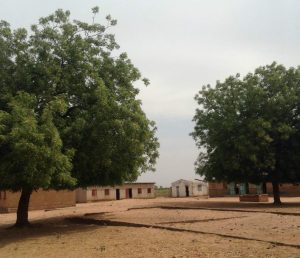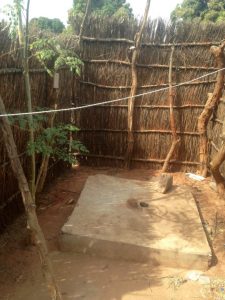This project is made possible through the partnership of Water Charity and the National Peace Corps Association. ![]()
Location
Badoudou, Department of Foundiougne, Fatick Region, Senegal
Community Description
Badoudou is a small rural village of approximately 800 people, in the Fatick Region of Senegal. Livelihood primarily consists of subsistence millet and peanut farming, but due to the village’s close proximity to the mangroves, fishing and gardening also generate income. However, the community is still extremely poor.
The majority of households, which hold an average of 14 people, most of whom are children, do not have access to essential facilities, such as latrines or water.
Badoudou has a French primary school, which also serves three surrounding villages. Badoudou also has a daara, an Arab school, which serves and lodges more than 70 children from nearby islands, year-round. Both schools have committees dedicated to bettering the lives of their students.
Additionally, the village has a health hut, a two-roomed facility, staffed by one health worker to provide basic health care, such as first aid and malaria treatment, as well as a midwife to deliver babies. The health hut also has a functioning health committee, which is committed to providing the community with the information and materials necessary to keep themselves healthy and prevent disease.
Badoudou is made up of almost 100% Sereers, a lively ethnic group with a beautiful culture. For generations, the village has been home to the same families, and thus the atmosphere of the community is very supportive, and all decisions are made collectively. The people of Badoudou have determined their greatest need is for a latrine and WASH project after discussing the health status within the community, and are very committed to its success and grateful for the opportunity.
Problem Addressed
In Badoudou, community members are constantly sick with coughs, colds, diarrhea, constipation, vomiting, and fever. Young children experience this burden in excess, both in severity and frequency. It is most noticeable during the rainy season, when bacterial infections leave many out of work and school for days and require mothers to walk their sick children the seven kilometers to the nearest hospital, too frequently. This can primarily be attributed to poor hygiene and sanitation, due to open defecation and lack of handwashing. Without the knowledge of hygiene and health and the facilities to keep the community clean, the people of Badoudou are suffering too often and living in fear of disease.
After a health baseline survey was performed in Badoudou, results showed the community to have a high incidence of hygiene-related illness, especially amongst children under five. In Senegal, diarrheal disease and pneumonia represent the top causes of death for children under five, behind malaria. Survey results also showed that 55 out of 67 households within the community did not have a latrine, and thus a majority of the population practices open defecation in their own yards, or in nearby fields.
Additionally, neither the French nor Arab school in the village has a latrine or handwashing station, leaving over 200 students without access to proper sanitation. Finally, survey results showed that members of Badoudou do not have the knowledge of how hygiene impacts their health, and do not take important measures, such as hand washing, to prevent disease. When asked about handwashing practices, the households generally only mentioned before meals as a critical time, and typically use a communal bowl of water with no soap. No household presented a designated handwashing station.
After a community-wide meeting to discuss the survey results, all in attendance determined a latrine and hygiene project to be most beneficial for the community as a whole. It has the ability to improve community-wide sanitation due to access to latrines, as well as to encourage healthier hygiene practices through health talks and school programs. A large-scale WASH project is essential to improving the overall health status in this community.
Project Description
The Badoudou WASH Education and Latrine project is composed of three phases:
First, a curriculum has been developed to teach the students at both the French elementary school and the Arab school about the importance of hygiene for health, as well as how to adopt better practices. Activities include a course on germ theory, a WASH mural painting, soap making, hand wash station building, as well as a day of filming students’ skits and songs on related topics. The school directors, teachers, as well as some students will be leading these activities.
The second phase of this project is a series of similar health training for the rest of the community members. A member from each household will be required to attend each training in order to be eligible to receive a latrine. The topics include hygiene and related illnesses, hand washing and hygienic behaviors, soap making and hand wash station building, and finally latrine usage and maintenance. This training will be led by volunteers in the community, members of the health committee, local NGO representatives, and the local hospital’s hygiene agent.
The final, and most important phase of this project, to which the vast majority of funding for this project will be dedicated, is the building of improved latrines for community-wide access. Fifty-five households will receive a simple pit latrine. These will be 2 x 2-meter square pits, lined with bricks, cemented over, and capped with iron bars and concrete. This model is the most basic, yet hygienic and sustainable option. The cement lining prevents the latrines’ contents from contaminating the surrounding ground, and thus keeps the community cleaner. It will be durable throughout rainfall, is large enough to last years, and can be pumped out and reused in the future.
 Additionally, the two schools in the village will each receive one 2 x 2-meter pit latrine, but attached via PCV piping to a Turkish toilet, in a 1 x 1-meter stall for privacy. Each pit is to be dug by household and community members, while village masons will be constructing bricks and the rest of the latrines. Funds for this project will go primarily towards the cement, concrete, and metal for latrine construction, as well as some labor fees. In addition to digging the pits, the community will be transporting all materials, as well as contributing sand, water, and cash.
Additionally, the two schools in the village will each receive one 2 x 2-meter pit latrine, but attached via PCV piping to a Turkish toilet, in a 1 x 1-meter stall for privacy. Each pit is to be dug by household and community members, while village masons will be constructing bricks and the rest of the latrines. Funds for this project will go primarily towards the cement, concrete, and metal for latrine construction, as well as some labor fees. In addition to digging the pits, the community will be transporting all materials, as well as contributing sand, water, and cash.
Project Impact
This project will impact 975 people.
Peace Corps Volunteer Directing Project
Lindsay Reesing
Monitoring and Maintenance
When the project is completed, improved health status, as well as improved health behaviors are expected across the community. Aside from improved latrines, expected outcomes of this project include an increased number of handwashing stations, as well as members using these stations at the necessary times. Additional outcomes include women being educated on childhood illness prevention, a decreased number of children who had coughs, colds, and diarrhea, and an increased number of their parents seeking care.
As these outcomes are recognized within the community, and members believe in the success of the project, it is expected that they will take responsibility for their health and embrace behavior change to improve overall health status.
Each household will be monitored over the next year to assess this change through a series of home visits by community health workers. The incidence of illness, as well as methods and urgency of treatment, will be measured. WASH behaviors will be observed, and barriers to these behaviors determined. Depending on the progress that has been made, additional training can be developed to re-ensure that community members have all the knowledge necessary, and are taking the proper steps, to keep their families healthy.
Comments
The community organization that is involved with this project is the Badoudou Health Committee. As Badoudou’s health committee also serves two other nearby villages, this project is an example to possibly be implemented again over the next few years.
Dollar Amount of Project
$5,500
Donations Collected to Date
$50
Dollar Amount Needed
$5.450
![]() ADOPT THIS PROJECT BY CONTRIBUTING THE DOLLAR AMOUNT OF THE PROJECT.
ADOPT THIS PROJECT BY CONTRIBUTING THE DOLLAR AMOUNT OF THE PROJECT.
Donations of any amount will be appreciated. The full amount will allow you a posted dedication if that is something you would like.